There are many stories that Canadians do not regularly learn in school. Its history is littered with forgotten events, either deliberately overlooked, or rationalised away somehow.
This lacuna in our collective knowledge is not limited to events which impacted indigenous peoples. You might reach adulthood without ever once being aware that in 1918, twelve ‘enemy languages’ were banned in Canada, including Ukrainian and German, and that there were periods of sharp repression even after this ban was lifted. You might not know that 4000 Canadian citizens of Ukrainian decent were interned along with other ‘enemy aliens’ from 1914 – 1920 while 80,000 others were forced to ‘check in’ with police from time to time.
You might have no idea that in 2005, a Bill was passed to acknowledge these historical wrongs, only a few years before the last survivors of interment died. You might not know that a $10 million fund was set up to commemorate these events and to raise awareness. You might not know any of this unless it is a part of your family’s history (and perhaps not even then), because it was never talked about officially until so very recently.
I bring this all up, because I am often faced with incredulity when I talk about the things that indigenous peoples in Canada have experienced. People are shocked that they were not aware of these things. Perhaps they think that it is strange such things have been kept quiet.
I submit that this is not strange at all. I too was raised within a system that lauded Canada’s achievements at home and especially internationally. We celebrate the good stories and occasionally mention some of the bad things in a ‘those were different times’ sense. The overriding narrative is that Canada has always tried its best. It is a good country that has sometimes done bad things.
I am not here to say the opposite is true. But our collective national history is not yet complete. I have lived through the recognition of Japanese internment, an apology for the Chinese Head Tax. I learned in University and at Holocaust museums that Jewish refugees were turned away from Canada in the 1930s, and how many of those people died in the Holocaust as a result. These things are slowly coming to the surface. Bubbling up and becoming part of our national narrative in an official way.
Canada’s history is littered with abuses. If we want Canada to live up to a reputation as a nation that respects human rights, we have to face the horrors of the past, head on. We have to acknowledge what was done, and how people managed to justify these things. We are only beginning this journey of self-discovery.
This is not just the history of individual Sikh and Muslim and Hindu families, of individual Chinese families, of only Jews and Japanese and Ukrainians and Germans and Blacks. This is Canada’s history, and we do not fully acknowledge it. In its glories and triumphs, in its failures and repressions. It is no weakness to admit these things and learn about them. It is considered a truism we must learn from our mistakes, yet we still seem to shy away from talking about them and teaching them.
I have had people say they feel I do not sympathise with the plight of others. Actually, that’s not entirely accurate. I have had people say that I minimise ‘white’ settler experiences, as I have yet to have someone from another group make this claim.
In fact, I strongly believe that all of Canada’s closets need cleaning. I speak from my perspective as a Métis woman struggling to recover her own history, a history that was denied even while it was whispered about in kitchens, around fires. I freely acknowledge that our story is not the only story, but I cannot bear the burden of speaking for all people. I cannot even speak for all Métis.
When I reach out, and explain our history to those who do not yet know it, I am rediscovering it too. When I reach out this way, I am not telling you that your history is irrelevant. I cannot spend time prefacing my articles with proof that I understand a great deal of the oppression that has been faced by non-natives in Canada before I tackle the oppression native peoples have, and continue to face. I can only keep learning the histories. All of them.
This is all I am asking of Canadians. I ask that you learn all the histories. That you learn our history too. If somehow, this seems like an unreasonable request, or you feel that I am not asking ‘politely enough’, then that is your choice. kiyam.
Please do not tell me I am wrong in my approach. That if only I did things the way you want me to, I would be more ‘successful’. Do not expect me to become an expert in your history before I am allowed to tell you about mine. Do not assume I know nothing of your history merely because I am speaking about mine.
The fact is, I am not alienating every settler out there, because I have had incredible responses from ‘white’ people which have been very heartening. If you are not among that group, and feel slighted somehow, I am sorry. It is not my intention. But I cannot please everyone, and I do not aspire to such.
And sometimes we need to agree to disagree, because communication can become hopelessly convoluted and eventually impossible at times. That’s okay too. After all, I am asking for there to be even more variety in experiences discussed at the national level, not less.
I’ll be over here, sweeping out this closet. Perhaps when we clean out all the skeletons, we can pack those closets with sweeter smelling things.
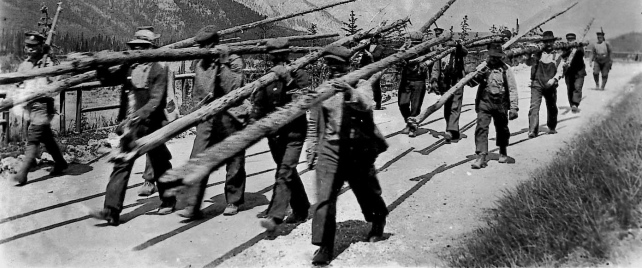
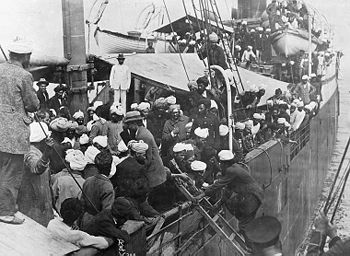
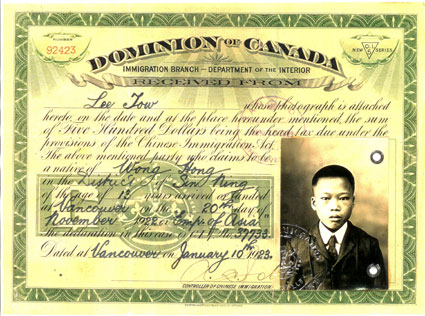
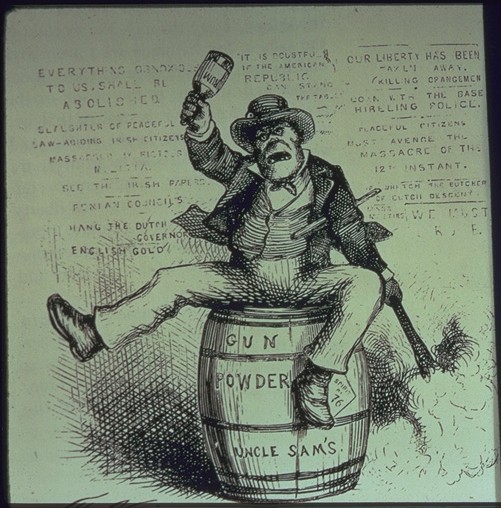
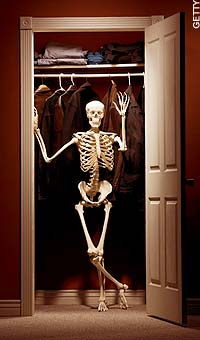
18 Comments
Emo · April 18, 2012 at 9:49 am
And those Irish, Germans, etc., all made a decision: they decided to buy a ticket, get on a boat, and join the British Empire. Those were politically significant decisions within their own societies (e.g., Ireland and Germany of the 19th century) –and they had political ramifications for the individuals who bought the ticket, and for the native people in the land that they had decided to “settle” under the aegis of the British Empire.
The Cree didn’t have a choice. They didn’t choose to come here; and, aside from brief periods when they had a choice between the French Empire and the British, they certainly had no choice about colonization. They didn’t have the choice to get on a boat and go somewhere else, and, in many cases, they didn’t have the choice to stay on the land they had been living on, either.
Soon enough, they didn’t have the choice to speak their own language, nor practice their own religion, and so on.
Even Poundmaker, who at first refused to sign the treaty, later did so because (apparently) it seemed that there was no choice.
It is simply not the case that Europeans who voluntarily decided to get on a boat and join in with British colonialism have the same “victim” status as (e.g.) captive slaves (who were forcibly relocated in chains by the same empire). There are some remarkable examples of white slavery within the British Empire, and there are some remarkable exceptions to the rule, but at some point I’ve got to say, “So what?”
This will never be a “New England”. This will never be a “New Germany”, or a “New Ireland”, either. This will always be a land defined by a colonial project that was genocidal in its intentions, and partly genocidal in its outcomes.
Instead of feeling powerless before the spectacle of that history, I would emphasize that there are things that are decisively left for our generation to determine: it’s left for our generation to determine if Cree (and other indigenous languages) will go extinct, or be revived. It is left for our generation to determine if there will ever be bank machines that have the instruction “Enter PIN number” written in Cree, and if there will ever be “No Smoking” signs on the wall hanging in Cree. That’s our struggle, in the 21st century, now –and it’s a struggle that inevitably demands the support of the descendants of the Germans, the Irish, and anyone who can pitch in.
Re: “I bring this all up, because I am often faced with incredulity when I talk about the things that indigenous peoples in Canada have experienced. People are shocked that they were not aware of these things.” That is really just a sign of the extent to which the propaganda is working; that, and also the extent to which our generation feels a sense of self-importance, and can’t imagine that there are important and profound things worth knowing that are left aside for them to discover for themselves –that no-one will teach them, but that they must reach out for and dig up themselves. The attitude is that all the facts worth knowing were listed as ingredients on the side of a coke-can, and that some benevolent government ensures that anything contained therein must be listed honestly, alongside the sugar and caffeine (“How preposterous! I assume someone would have told me!”).
Siusaidh · April 18, 2012 at 1:14 pm
The Irish did not decide to join the British Empire – they were conquered.
And becoming even semi-independent (the Irish Free State) cost many lives and a long struggle. The Irish battle for decolonization was a model to many other decolonizers, eg. in India and the Caribbean.
Emo · April 19, 2012 at 9:22 am
Wrong:
Irish made the individual decision to get on a boat and fight for the British Empire overseas, and they were decorated for doing so all over the world, from Canada to India, and beyond.
“Irish volunteers formed the backbone of recruitment to the British Army for more than two centuries until Irish independence. At one point during the 19th century 42 percent of soldiers in the British Army were Irish born, which meant there were more Irish soldiers in the army than English.” http://en.wikipedia.org/wiki/Recruitment_in_the_British_Army#Irish_regiments
The Irish participated in colonialism and genocide all over the world, under the British flag, and they signed up to do so voluntarily.
The Irish who settled Canada did not do so as slaves, forcibly re-settled from Africa in chains (please actually read what I’ve said on both issues above) –they did so as volunteers joining in the British Empire.
As I stated, that was a politically significant decision in their own society: not all Irish thus volunteered, and not all regarded it as a good thing, but, paradoxically, there were plenty of Irish who thought it was heroic to go and fight on behalf of the British in the colonies (India, Canada, etc.), while remaining Irish nationalists in some sense. The empire contained many such contradictions, and the academic literature on this history is already prolix (and self-pitying).
Your statement that “the Irish did not decide to join the British Empire” does not contradict my point, because you’re talking about the Irish who stayed in Ireland and I’m talking about the Irish who made the decision to conquer and “settle” places like Canada. The latter was indeed a decision to join the British Empire, and to fight for its flag, and everyone in Ireland knew it.
myna lee johnstone · April 18, 2012 at 9:53 am
When i had my first baby, in 1969 i wanted a cradleboard. Her father went downtown in Saskatoon and came back with one. it was beautiful and was eventually passed around to many friends for use with their babies
when we returned to montreal a few months after the birth ,we were invited by a friend at the NFB, where we worked ,to his parent’s home in the Laurentians for dinner
I arrived with my brown eyed baby in the cradleboard.My friend’s mother, upper class english white, got it into her brain that evening that i was “Indian” She started dropping subtle comments, during the evening, and i finally grokked it at the dinner table when she waltzed passed me saying: better mind the silver”
What was ironic that night was at the sametime she was dropping comments,there was a Rowan and Martin program on racial prejudism in the background of the living room
When I was asked if i would like a drink when we arrived, not being much of a drinker, i chose, rum, she rolled her eyes, ofcourse,whatelse but rum
When i went to change my baby’s diaper and she was in the washroom with her grandchildren, she told them, we wash our hands, we’re not dirty…indians!”
On the way back, I mentioned this to my friends, they scolded me for saying such a thing, and said i must have made it up
i grew up in a small rural prairie community. my father often swore about the goddamn pea soupers and the niggers
He used to tease my mom that i wasn’t his, i was some halfbreeds across the tracks
When i realized the woman thought i was Indian, i went outside, sat down on the porch and remembered my father’s comments
I concluded, well, if I am part Indian, I am going to be proud of it
My skin is quite white, in my view..
While attending a student union conference during university days, a Quebec student flirted with me, but his friend looked at him with disdain and said:” Elle est Anglais!” They quickly exited.
âpihtawikosisân · April 18, 2012 at 10:32 am
Powerful examples of how people’s beliefs can impact their behaviour towards others, with nothing more than their stereotypes to go on. Thank you.
Amy · April 18, 2012 at 10:24 am
Fantastic, thank you! I really mean that. I continue to enjoy your blog, but this is something I have tried to put into words and have failed to, so I am sharing your link to this.
Lynn Harris · April 18, 2012 at 11:26 am
Keep on doing what you do. There is so much we to learn!
Jadey · April 18, 2012 at 11:37 am
A lot of us Canadians spend a lot of time trying to ‘clean up’ our history, especially by comparing ourselves favourably to things that happened in the US. Take the underground railroad – supposedly Canada’s great moral triumph! While ignorant, arrogant white Americans were enslaving black people, we were freeing them and giving them a place to live! Oh, and also driving them out of their own settlements so that new European immigrants could settle instead. Oh, and we had slavery too. Oh, and we still have all kinds of individual bigotry and systemic racism. But we don’t teach that part. (At least not when I was in school.)
Sometimes I hear people get very hung up on things like, “Well, I wasn’t alive then? What do you want me to do about it now? Should I just feel guilty forever for something I can’t change?” My response is always, 1) not all of this stuff is historical – much is current and on-going and still needs active resistance, and 2) history is history – you can’t change it, but you can’t ignore it. It’s not about feeling guilty, it’s about being honest and understanding where you came from so you can understand where you’re going.
It’s also the reason I hate Olympic games (not the sports, which are great, but the spectacle and the politics) – because every time each country uses it as a chance to paint an idyllic version of what they would like to think their country is, often having to erase and ignore the imperfect realities in order to do so. A complete step back. On a personal level, being honest with oneself about one’s flaws and failings while not giving up on a basic sense of self-worth is crucial to self-improvement (I can accept who I am and that I am not perfect and I can learn to change without self-hatred) – I wish we could learn to do that on a national level.
Sharon Jackson · April 18, 2012 at 2:44 pm
Jayde wrote: “It’s also the reason I hate Olympic games (not the sports, which are great, but the spectacle and the politics) – because every time each country uses it as a chance to paint an idyllic version of what they would like to think their country is, often having to erase and ignore the imperfect realities in order to do so.”
I agree. Case in point the most recent Olympics in Vancouver where they got a company to machine knit the unauthentic “Cowichan Sweaters” for the Canadian Team. While most knitters agree they could not have made the quantity of sweaters required in time, there was no consultation, which was very insulting to the Cowichan people.
They eventually allowed the knitters to sell their products at the First Nations’ Pavillion, but really it was a case of too little, too late.
Jadey · April 18, 2012 at 11:42 am
One more thing. This puts me in mind of my problems with Canada Day. I don’t hate this country, I think there is a lot of merit and a lot of potential for more in it, if we can get our shit together on some big issues. But I can’t bring myself to celebrate our history uncritically, which is what the festivities around Canada Day always seem to be asking me to do. The creation of this country was too much a part of and the result of actions that I will never condone, even if (no, ESPECIALLY because) I personally profit from them as a white settler. I would be so much prouder of my nationality if we would, on a large scale, truly own up to and own our problems and the things we can’t ever be proud of but which have fundamentally contributed to where we are now. Like a reformed criminal, we can’t change the past, but we can change how we *treat* the past and how we treat people in the present.
Catherine · April 18, 2012 at 2:10 pm
As a Canadian historian, amen and amen.
You haven’t alienated this settler yet, and you have given me alot. Thank you.
But we do need more than all the stories – my settler students need to make meaning out of the stories – and I need to give them a meaning they can use to be good people. And I need to replace the identity that I take away from them when I take away Canada the good. That is a challenge when you’re dealing with the material we’ve got. I ask them to help me. We’re working on it together. Your blog helps me with our project.
âpihtawikosisân · April 18, 2012 at 2:23 pm
“And I need to replace the identity that I take away from them when I take away Canada the good.”
This is an very important point. When I teach my children about the Chinese Head Tax, for example, and what an important impact Chinese immigration had on how Canada is today, I do not just tell them the sad stories. The strength, the bravery and tenacity of those who came and stayed and survived, has made an indelible mark on the fabric of this nation. I believe that if we can acknowledge the wrongs that were done, then we can more honestly celebrate the successes.
Kiaayohkats · April 18, 2012 at 8:46 pm
“Anti-Irish sentiment was not just felt in the US, but had strong roots here in Canada as well.”
I’ve always wondered to what extent the marginal treatment of the Irish, as well as their religion, contributed to what seems to me to have been a high degree of intermarriage between Irish and Métis. Empirically, I’m not sure how frequent the phenomenon is, but since both of my grandmothers have one Métis parent and one Irish parent, it struck me as a trend early on. Since then, I’ve noticed that this is the case for many other families too.
Eva · April 19, 2012 at 12:12 am
The Irish were starving – potato famine – had to go to poorhouse (compelled) where men and women and children were separated – all children over two were taken away from their parents . If you lucked out a do Gooder sponsored your family to be relocated in Canada as indentured servants…what a “choice”!
Claude Theoret · February 16, 2016 at 4:17 pm
Once again great work. Year’s ago I learned about how Amherst exterminated Ontario’s Objiway population during Pontiac’s rebellion and later to make room for Loyalist settlers in Normand Lester’s Book “The Black book of English Canada”.
https://en.wikipedia.org/wiki/Le_Livre_noir_du_Canada_anglais
“Lester argues that the myth of two equal, amicable co-founders of the nation, a myth actively promoted by the federal government over recent decades, ignores the fact that there will always be two incompatible national histories.”
We can’t get anywhere until we flip the narrative | Declaration of Indigenous Rights · September 5, 2013 at 1:56 pm
[…] is not to say no effort has been made. The inclusion of events into the mainstream consciousness that I only heard rumours about when I was in school, has been […]
We can’t get anywhere until we flip the narrative » Delusions of Development · October 25, 2013 at 12:31 pm
[…] is not to say no effort has been made. The inclusion of events into the mainstream consciousness that I only heard rumours about when I was in school, has been […]
Canada’s closet packed with Skeletons – Brads Indigenous Perspective · June 20, 2017 at 6:20 pm
[…] https://apihtawikosisan.com/2012/04/canadas-closets-packed-with-skeletons/ […]